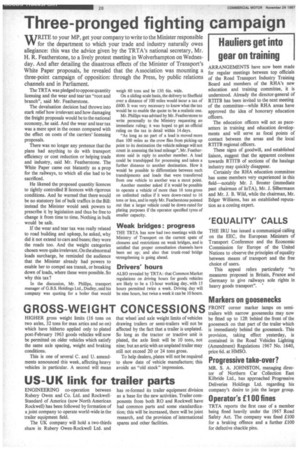Three-pronged fighting campaign
Page 28

If you've noticed an error in this article please click here to report it so we can fix it.
WRITE to your MP, get your company to write to the Minister responsible for the department to which your trade and industry naturally owes allegiance: this was the advice given by the TRTA's national secretary, Mr. H. R. Featherstone, to a lively protest meeting in Wolverhampton on Wednesday. And after detailing the disastrous effects of the Minister of Transport's White Paper proposals, he revealed that the Association was mounting a three-point campaign of opposition: through the Press, by public relations
channels and in Parliament.
The TRTA was pledged to oppose quantity licensing and the wear and tear tax "root and branch", said Mr. Featherstone.
The devaluation decision had thrown into stark relief how irrelevant and how damaging the freight proposals would be to the national economy, he said. And the wear and tear tax was a mere spot in the ocean compared with the effect on costs of the carriers' licensing proposals.
There was no longer any pretence that the plans had anything to do with transport efficiency or cost reduction or helping trade and industry, said Mr. Featherstone. The White Paper came out blatantly as a prop for the railways, to which all else had to be sacrificed.
He likened the proposed quantity licences to tightly controlled B licences with rigorous conditions. And he warned that there would be no statutory list of bulk traffics in the Bill: instead the Minister would seek powers to prescribe it by legislation and thus be free to change it from time to time. Nothing in bulk would be safe.
If the wear and tear tax was really related to road building and upkeep, he asked, why did it not extend to cars and buses; they wore the roads too. And the weight categories chosen were quite irrelevant. On the abnormal loads surcharge, he reminded the audience that the Minister already had powers to enable her to compel sea transit, or breaking down of loads, where these were possible. So why this tax?
In the discussion, Mr. Phillips, transport manager of G.B.S. Holdings Ltd., Dudley, said his company was quoting for a boiler that would weigh 60 tons and be 13ft fiin. wide.
On a sliding-scale basis, the delivery to Sheffield over a distance of 100 miles would incur a tax of £600. It was very necessary to know what the tax would be to enable the quote to be a realistic one.
Mr. Phillips was advised by Mr. Featherstone to write personally to the Ministry requesting an immediate ruling; it was hoped to get an official ruling on the tax in detail within 14 days.
"As long as no part of a load is moved more than 100 miles as the crow flies from picking-up point to its destination the vehicle mileage will not count in assessing the load mileage", Mr. Featherstone said in reply to another member. A load could be transhipped for processing and taken a further distance to another destination. How it would be possible to differentiate between such transhipments and loads that were transferred from one vehicle to another was a moot point.
Another member asked if it would be possible to operate a vehicle of more than 16 tons gross on unlimited radius if it were down-rated to 16 tons or less, and in reply Mr. Featherstone pointed out that a larger vehicle could be down-rated for plating purposes if the operator specified tyres of smaller capacity.
Weak bridges: progress
THE TRTA has now had two meetings with the Ministry of Transport on the current spate of closures and restrictions on weak bridges, and is satisfied that proper consultation channels have been set up; and also that trunk-road bridge 'strengthening is going ahead.
Drivers' hours
ALSO revealed by TRTA: that Common Market regulations on driving hours for goods vehicles are likely to be a 13-hour working day, with 15 hours permitted twice a week. Driving day will be nine hours, but twice a week it can be 10 hours.
'EQUALITY' CALLS
THE IRIJ has issued a communique calling on the EEC, the European Ministers of Transport Conference and the Economic Commission for Europe of the United Nations to observe the principles of equality between means of transport and the free choice of users.
This appeal refers particularly "to measures proposed in Britain, France and Germany to give railways sole rights in heavy goods transport". '
Markers on goosenecks
FRONT corner marker lamps on semitrailers with narrow goosenecks may now be fitted up to 12ft behind the front of the gooseneck on that part of the trailer which is immediately behind the gooseneck. This provision, taking effect yesterday, is contained in the Road Vehicles Lighting (Amendment) Regulations 1967 No. 1640, price 6d. at HMSO.
Progressive take-over7
MR. S. A. JOHNSTON, managing director of Northern Car Collection East Kilbride Ltd., has approached Progressive Deliveries Holdings Ltd. regarding his company's desire to join the larger group.
Operator's £1 00 fines
TRTA reports the first case of a member being fined heavily under the 1967 Road Safety Act. The company was fined £100 for a braking offence and a further 1100 for defective shackle pins.












































































































































